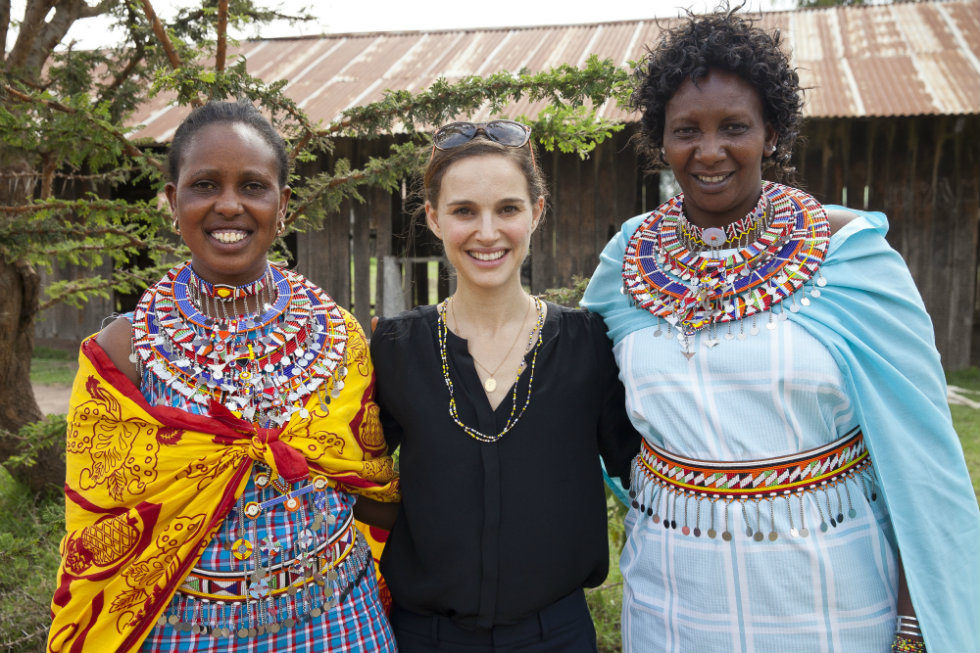Women empowering women: Natalie Portman’s journey to Kenya

With a string of beads in one hand, Natalie Portman threw her head back and laughed, flashing her contagious smile while sitting cross-legged with a group of Maasai women under the Kenyan sun. The layers of beaded necklaces encircling their necks jingled softly as they made jokes and exchanged stories of motherhood. This jewellery is made from the same beads Natalie held in her hands and like these women have been taught from their mothers, she learned the tradition of beading the Maasai way. It’s been a part of preserving their culture and it’s also been a way to earn a better life. Through our Artisans program, each woman makes a sustainable source of income from beading, allowing her to afford things she never imagined like fixing a leaky roof and paying for her children’s school fees. There are many similarities that connect us all as women, but Natalie also learned we share a common goal: to make the best possible life for our families.
Sitting down with Natalie, we realized she’s known as much for her advocacy as she is for celebrity. She’s been a long-time friend of ours as a Free The Children ambassador through the Power Of A Girl project and supported the Kisaruni All-Girls Secondary School in Kenya. She even donated her Rodarte designer gown—worn at the premier of Black Swan. In 2012, the proceeds of Natalie’s Dior lipstick went toward 24 full scholarships for each of the students attending Kisaruni. Earlier this year, she travelled to Kenya with us to meet the very girls who received those scholarships and learned how our projects are empowering both the current and new generations of women.

What was it like to bead with the Maasai women?
It was really wonderful to bead with all the women from the women’s empowerment centre who have been making these Rafikis for generations upon generations. Free The Children has enabled them to find a market for their Rafikis and extend the benefits of this old art form. It was also interesting to hear how their lives have been changed and how this business empowers the family to be able to earn more collectively as a group and send more kids to school, eat better, have better health care and better shelter, and generally improve their family’s position.
What do you think about their traditional style of beading?
That’s the beauty of this project—it’s preserving and encouraging a cultural tradition rather than trying to impose any sort of external values or aesthetics on the society. And they have such a beautiful aesthetic, so colourful and so traditional. This work really just continues that tradition.

What was it like visiting Kisaruni and meeting the students you supported?
It was so inspiring to meet these young women, they’re so motivated and just really squeezing every ounce of possibility out of this opportunity—it’s impressive. I keep saying it, but it’s crazy they are studying nonstop. They have to drag the girls out of the library so they get some sleep! They take so much pride in what they’re doing. They’re ambitious and when you ask them what they want to be, they say, ‘doctor, lawyer, engineer, journalist.’ All of them said that they would want to be president one day. They all want to come back to their own communities and improve them. American kids who ever complained about school—myself among them—you think, if only I had known what a luxury school is, I’d never take it for granted.
Why do you believe it’s important to support girls’ education?
There’s been so much research about how once girls are educated, the whole society blooms because they get married later and are not child brides. Their work potential rises, their ability to care for their own and their family’s health improves, their own and their family’s nutrition improves, the ability to provide for their family improves. Investing in a girl is the best seed to plant a complete, thriving community. If you want to help an entire community, it’s the simplest seed you can plant that will really bear fruit. Being a woman and once having been a girl, it’s personal—you relate in a different way.

What does it mean to have the chance to travel to Kenya?
I think it really could be a life changing, really important experience for a lot of people and it’s a totally safe, beautiful, comfortable, environment. I’ve done a lot of trips to developing parts of the world and this is by far the most comfortable—I would bring my kids here.
Follow in Natalie’s footsteps—learn more about ME to WE Artisans and ME to WE Trips.
Return